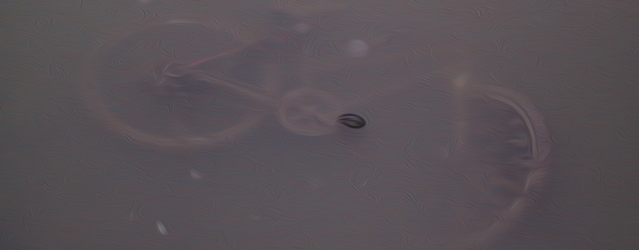
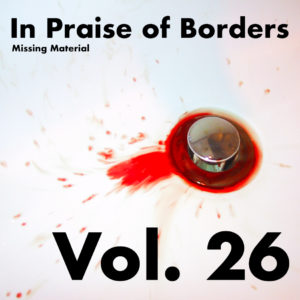 After more than two weeks, I’ve finally finished digitizing my music collection. All my CDs are sorted into boxes to donate to charity, with one box set aside for me to keep. My In Praise of Borders set lists have all been rebuilt, to the extent that they could be given the holes in my records. There wound up being 29 volumes; 26 original set lists and three discs worth of material that I know for sure I played but aren’t featured on any of the surviving lists. The final song of the final volume is “Natch,” by Cornershop and featuring Bubbley Kaur. The opening bars of “Natch” were part of my favourite station ID spot when I was a DJ at CKLU. It was put together by Natalie B., everyone’s favourite host, and I played it every show, if I could.
After more than two weeks, I’ve finally finished digitizing my music collection. All my CDs are sorted into boxes to donate to charity, with one box set aside for me to keep. My In Praise of Borders set lists have all been rebuilt, to the extent that they could be given the holes in my records. There wound up being 29 volumes; 26 original set lists and three discs worth of material that I know for sure I played but aren’t featured on any of the surviving lists. The final song of the final volume is “Natch,” by Cornershop and featuring Bubbley Kaur. The opening bars of “Natch” were part of my favourite station ID spot when I was a DJ at CKLU. It was put together by Natalie B., everyone’s favourite host, and I played it every show, if I could.
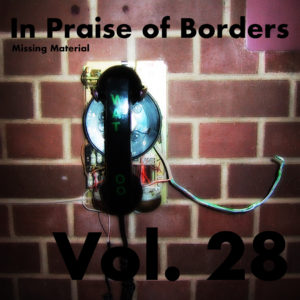 There are two “next steps” for my music: first, I’m going to recreate the website I had with the show and archive all these set lists, complete with the covers I’ve made. I won’t be uploading the music, but I will be linking to YouTube or band websites or whatever. I don’t have a Spotify account, so don’t expect any streaming playlists. Second, I now have to sort through all the digital music. I carefully managed the metadata when I was digitizing my CDs, but I have a lot of duplicate music, most of it from when I merged my “up north” music library on my laptop with my main music library at home. During my time in the north, with no real Internet access, it made more sense to manage my phone from my laptop than from my desktop, but that meant forking my music library, and the merge didn’t go very well. In some cases I didn’t know I was adding digital copies of things I already had, and in other cases it’s not clear that the songs really are duplicates, as different mixes as so on aren’t always labelled appropriately, even when you buy digital music from official sources (in fact, especially then; the file-sharing community is obsessive about the quality and accuracy of both the files and the metadata to a degree well beyond that of the music industry itself). Step two will take a very long time.
There are two “next steps” for my music: first, I’m going to recreate the website I had with the show and archive all these set lists, complete with the covers I’ve made. I won’t be uploading the music, but I will be linking to YouTube or band websites or whatever. I don’t have a Spotify account, so don’t expect any streaming playlists. Second, I now have to sort through all the digital music. I carefully managed the metadata when I was digitizing my CDs, but I have a lot of duplicate music, most of it from when I merged my “up north” music library on my laptop with my main music library at home. During my time in the north, with no real Internet access, it made more sense to manage my phone from my laptop than from my desktop, but that meant forking my music library, and the merge didn’t go very well. In some cases I didn’t know I was adding digital copies of things I already had, and in other cases it’s not clear that the songs really are duplicates, as different mixes as so on aren’t always labelled appropriately, even when you buy digital music from official sources (in fact, especially then; the file-sharing community is obsessive about the quality and accuracy of both the files and the metadata to a degree well beyond that of the music industry itself). Step two will take a very long time.

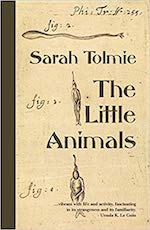 I went to my first reading in a long time on Wednesday, because Sarah Tolmie has a new book out. I’ve raved about her work repeatedly on social media, and I’ve mentioned more than once that I was a student of hers in undergrad. Her new book is called The Little Animals, and she told me that it’s a story she’s wanted to write since she was 13 years old. I’m only a couple of chapters in, but so far it seems to be about both the invention of the microscope and the Grimm fairy tale of the Goose Girl. Strange, but magical and engrossing. Tolmie’s work is always refreshing, and by that I don’t mean that it’s pleasantly different from the work of other writers, although it often is, but that I feel refreshed after reading her books. Her work is hopeful without ever being naïve or just plain dumb, the way aggressively optimistic speculative writing can often be.
I went to my first reading in a long time on Wednesday, because Sarah Tolmie has a new book out. I’ve raved about her work repeatedly on social media, and I’ve mentioned more than once that I was a student of hers in undergrad. Her new book is called The Little Animals, and she told me that it’s a story she’s wanted to write since she was 13 years old. I’m only a couple of chapters in, but so far it seems to be about both the invention of the microscope and the Grimm fairy tale of the Goose Girl. Strange, but magical and engrossing. Tolmie’s work is always refreshing, and by that I don’t mean that it’s pleasantly different from the work of other writers, although it often is, but that I feel refreshed after reading her books. Her work is hopeful without ever being naïve or just plain dumb, the way aggressively optimistic speculative writing can often be.
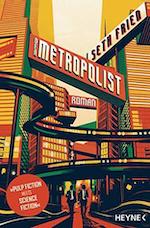 I’ve read three books in the last week. The first was The Municipalists, by Seth Fried, which seems tailor-made for me,[ref]It’s about an urban planner and an AI who try to save a city.[/ref] but which I had a sneaking suspicion I wouldn’t like. Well, suspicion confirmed. It seemed like Fried was trying very hard to write something like Max Barry’s Jennifer Government, which is to say a humorous satire about social organization that also worked as a thriller. Fried did not succeed; its politics were so aggressively centrist that it had virtually nothing at all meaningful to say about the social issues the plot hinged on, except that sometimes we do the wrong thing when we mean to do the right thing. The book literally ends with a message of “no matter where you stand on issues of justice you are wrong sometimes,” which is rather missing the point of satire entirely. The book was not funny, called back to the “good old days” of science fiction from the ’50s and ’60s in ways that were painfully juvenile,[ref]And somewhat surprising, given that Fried is likely younger than I am, and I’m not yet 40.[/ref] and grossly misunderstood urbanism in ways that felt like he thought writing speculative fiction meant he didn’t need to look anything up. I cannot imagine how an audience of any discernment could embrace this book, but it’s getting rave reviews even from people I know and respect, and the consensus seems to be that it’s hilarious. The humour has kind of a dad-joke vibe to it, but honestly, even dad jokes are funnier.
I’ve read three books in the last week. The first was The Municipalists, by Seth Fried, which seems tailor-made for me,[ref]It’s about an urban planner and an AI who try to save a city.[/ref] but which I had a sneaking suspicion I wouldn’t like. Well, suspicion confirmed. It seemed like Fried was trying very hard to write something like Max Barry’s Jennifer Government, which is to say a humorous satire about social organization that also worked as a thriller. Fried did not succeed; its politics were so aggressively centrist that it had virtually nothing at all meaningful to say about the social issues the plot hinged on, except that sometimes we do the wrong thing when we mean to do the right thing. The book literally ends with a message of “no matter where you stand on issues of justice you are wrong sometimes,” which is rather missing the point of satire entirely. The book was not funny, called back to the “good old days” of science fiction from the ’50s and ’60s in ways that were painfully juvenile,[ref]And somewhat surprising, given that Fried is likely younger than I am, and I’m not yet 40.[/ref] and grossly misunderstood urbanism in ways that felt like he thought writing speculative fiction meant he didn’t need to look anything up. I cannot imagine how an audience of any discernment could embrace this book, but it’s getting rave reviews even from people I know and respect, and the consensus seems to be that it’s hilarious. The humour has kind of a dad-joke vibe to it, but honestly, even dad jokes are funnier.
I also picked up Fate, the first book in Ian Hamilton’s prequel trilogy to his Ava Lee series. This first volume is about how “Uncle” Chow Tung became Mountain Master of his triad in the late 1960s. I enjoy these books despite myself. They are procedural to a fault, the writing being little beyond “this happened, then this happened, then this other thing happened,” with character development and style kept to an absolute minimum. Although unlike some thriller writers (*cough* Dan Brown *cough*), Hamilton actually appears to know what all the words he uses mean. And yet. And yet! I can’t put the goddamn things down. They just move like a runaway freight train. Hamilton’s work gets a little less inventive with every outing, but I still need that fix.
Finally I read Eliot Wilder’s 33 1/3 book about DJ Shadow’s Endtroducing… It was good, although it took the form of an extended, months-long interview with Josh Davis,[ref]DJ Shadow’s real name.[/ref] so it was light on the analysis that I normally expect from this series. Davis seems like an unusually introspective and self-aware guy, reluctant to take credit and more interested in talking about who helped him, where he failed, or whose work inspires him than he is about anything else, although there were some fun insights into his process.
I have watched the final season of Jessica Jones, and while I’m sure I have thoughts about it, just now I couldn’t tell you what they are. Maybe next week. For now I will say that it was a bit messy, but it made more sense than season two.
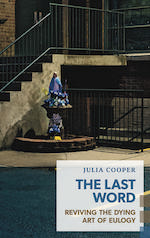 Over this past week I have found myself thinking a lot about Julia Cooper’s book The Last Word. Ostensibly it’s about reviving the art of the eulogy, but in fact it’s more about how our society understands and responds to grief in the modern world, and what that means for the individual. The book is full of research, but she also explores the topic through her own grief over her mother’s death. I read the book a week or two after Molly died, and I found it very useful for helping me understand what I was feeling. But I was skeptical: though I don’t remember the exact language she used, Cooper talks about it being well over a year before she was back to something that she could describe as a normal life after her mother died. Not that her pain left her, or that she was somehow “better,” but that she could make it through the day or the week without her life being this alien thing to her, something to be endured, not lived. I could understand the pain, but not the timeframe; no matter how much I loved someone, I couldn’t imagine being that much of a mess for that long. More than a year? Really? Well. Famous last words indeed. My mother died about three months after I read that book. It’s been eight months and ten days since the day my mother died, and more than a year doesn’t seem even remotely far-fetched to me. For the most part I’m okay, in that the most significant change in my day-to-day is that my ambient stress level remains extremely high for no obvious reason. But things still don’t feel “normal” in any way; I have not established a new equilibrium or a new zone of comfort. I have mostly stopped the outward displays of grief, but I will still occasionally cry at random. I know that I’m crying because I’m sad about my mother, but there’s no obvious trigger, and I don’t even necessarily feel bad in the moment. I sat down one evening last week to eat dinner and watch television, turned on my show, took a bite of my dinner, and burst into tears for ten minutes. No triggering event, no intense rush of sadness, nothing. I didn’t even feel sad. I even said, out loud, “what is happening?” And I just keep thinking about that Julia Cooper book, and how little I understood.
Over this past week I have found myself thinking a lot about Julia Cooper’s book The Last Word. Ostensibly it’s about reviving the art of the eulogy, but in fact it’s more about how our society understands and responds to grief in the modern world, and what that means for the individual. The book is full of research, but she also explores the topic through her own grief over her mother’s death. I read the book a week or two after Molly died, and I found it very useful for helping me understand what I was feeling. But I was skeptical: though I don’t remember the exact language she used, Cooper talks about it being well over a year before she was back to something that she could describe as a normal life after her mother died. Not that her pain left her, or that she was somehow “better,” but that she could make it through the day or the week without her life being this alien thing to her, something to be endured, not lived. I could understand the pain, but not the timeframe; no matter how much I loved someone, I couldn’t imagine being that much of a mess for that long. More than a year? Really? Well. Famous last words indeed. My mother died about three months after I read that book. It’s been eight months and ten days since the day my mother died, and more than a year doesn’t seem even remotely far-fetched to me. For the most part I’m okay, in that the most significant change in my day-to-day is that my ambient stress level remains extremely high for no obvious reason. But things still don’t feel “normal” in any way; I have not established a new equilibrium or a new zone of comfort. I have mostly stopped the outward displays of grief, but I will still occasionally cry at random. I know that I’m crying because I’m sad about my mother, but there’s no obvious trigger, and I don’t even necessarily feel bad in the moment. I sat down one evening last week to eat dinner and watch television, turned on my show, took a bite of my dinner, and burst into tears for ten minutes. No triggering event, no intense rush of sadness, nothing. I didn’t even feel sad. I even said, out loud, “what is happening?” And I just keep thinking about that Julia Cooper book, and how little I understood.
Anyway, that’s all for this week. Thanks for reading!